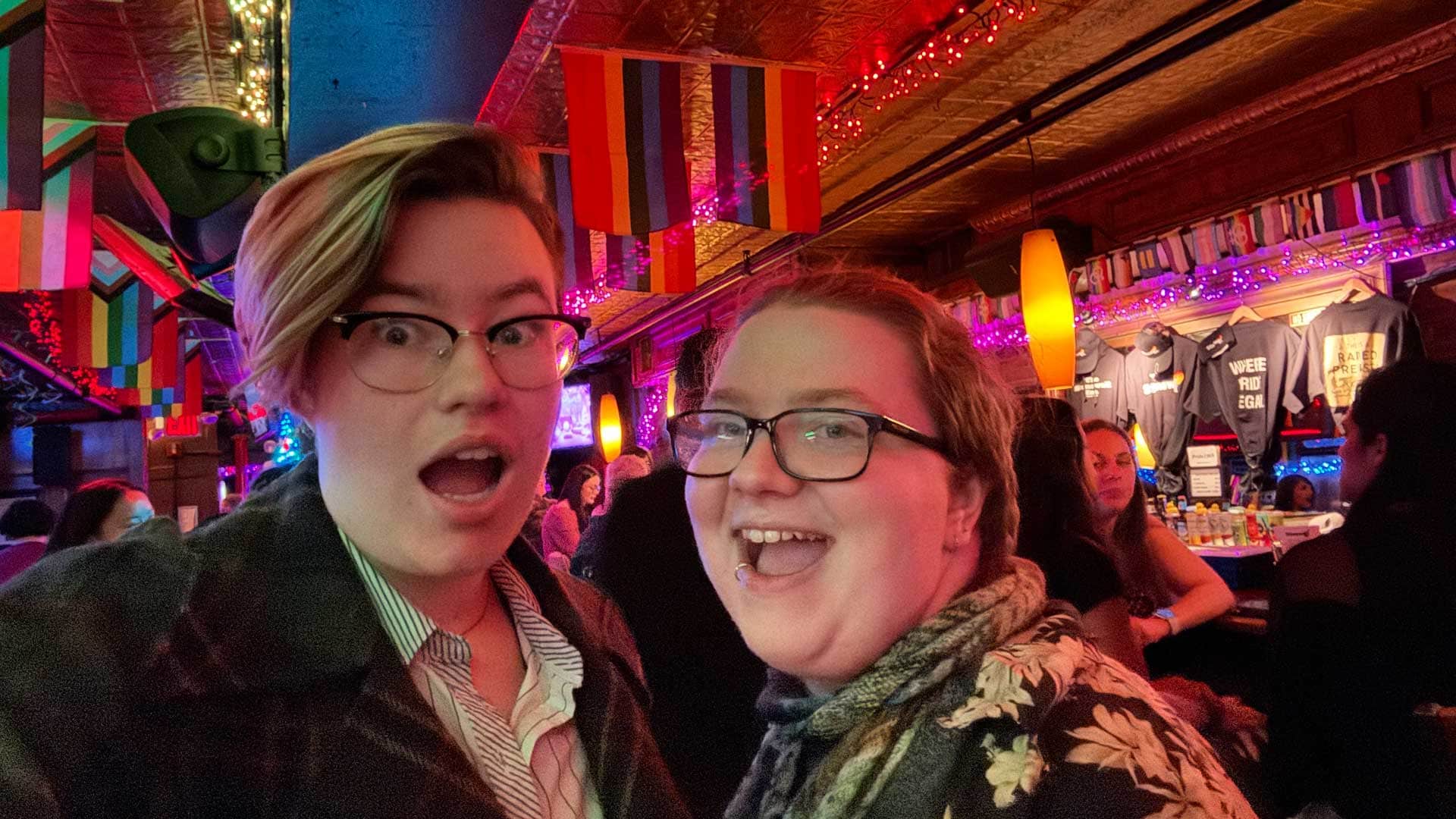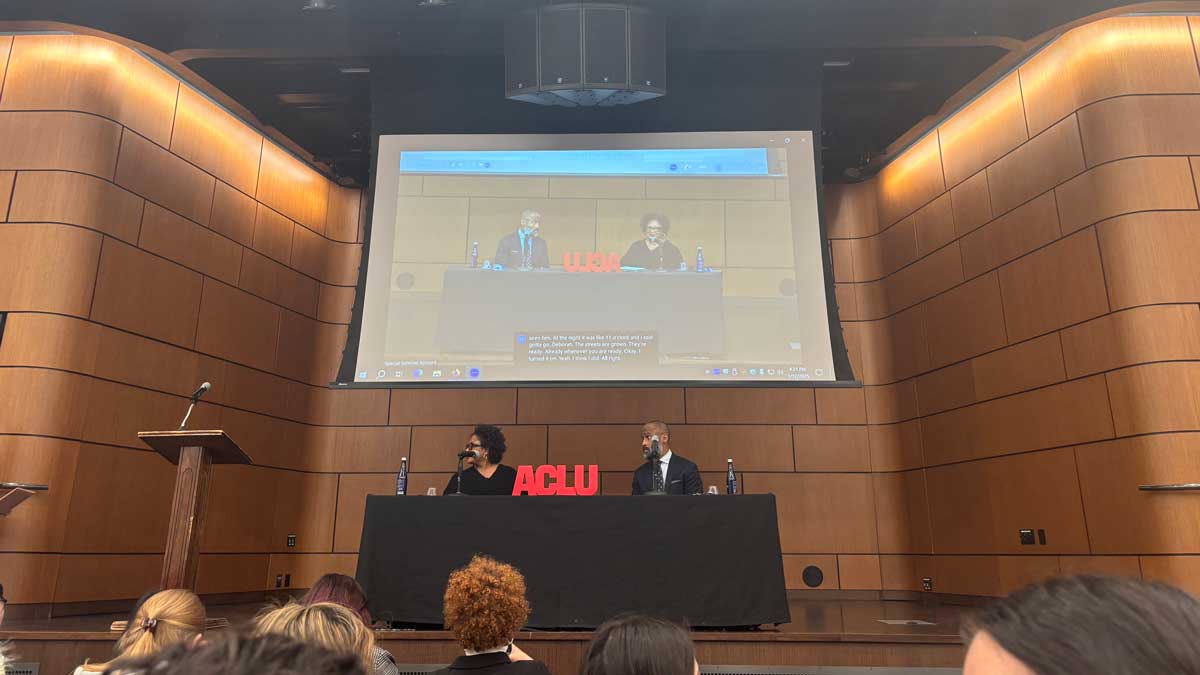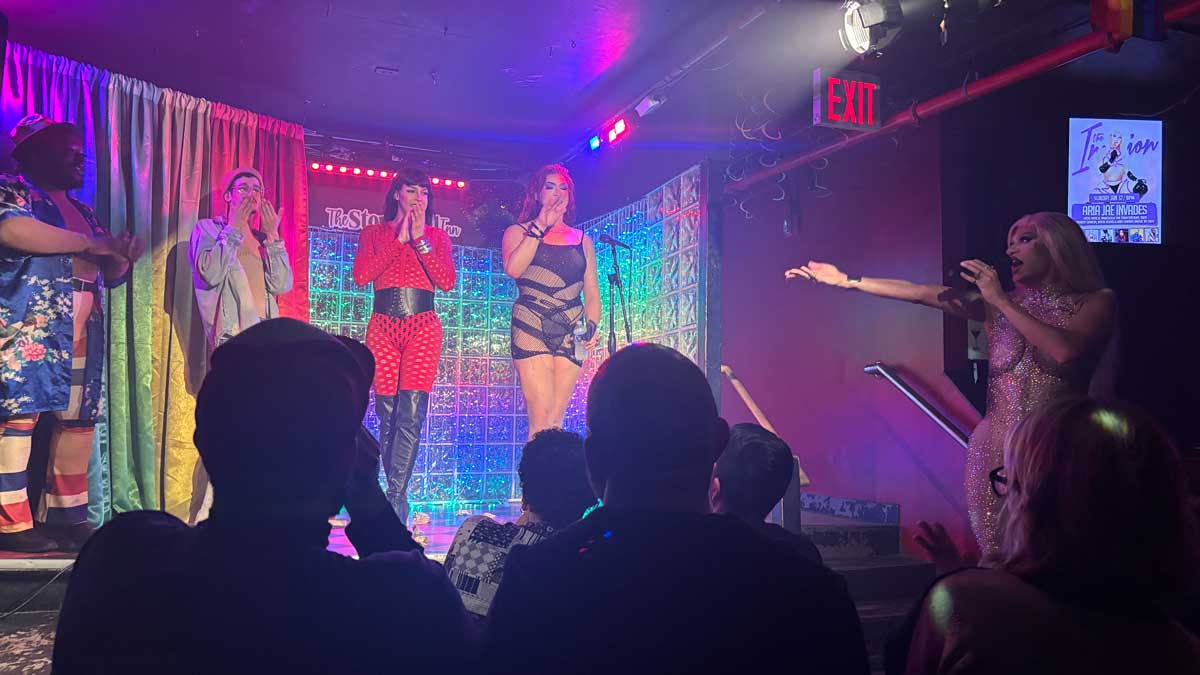- be_ixf; php_sdk; php_sdk_1.4.18
- 101 ms
- iy_2025; im_07; id_05; ih_20; imh_08; i_epoch:1.75177132627E+12
- ixf-compiler; ixf-compiler_1.0.0.0
- py_2025; pm_06; pd_10; ph_02; pmh_49; p_epoch:1.74954899939E+12
- link-block; link-block_link-block; bodystr
- pn_tstr:Tue Jun 10 02:49:59 PST 2025; pn_epoch:1.74954899939E+12
- 0 ms
- be_ixf; php_sdk; php_sdk_1.4.18
- https://sou.edu/academics/sou-english-major-student-attends-the-nyc-colleges-and-communities-advocacy-institute/
- https://sou.edu/academics/sou-english-major-student-attends-the-nyc-colleges-and-communities-advocacy-institute/

SOU English and Sociology & Anthropology Majors Attend the NYC Colleges and Communities Advocacy Institute
By Annalynn Mueller, senior English Major
February 26, 2025
Pictured above: Ally and Connor visiting The Stonewall Inn while in New York City
On January 10-13th, 2025, English and Gender, Sexuality, and Women’s Study (GSWS) major Connor Babbitt and Sociology and Anthropology (SOAN) major Ally Grommes attended the American Civil Liberties Union (ACLU) Conference in New York City for the NYC Colleges and Communities Advocacy Institute. They learned to use advocacy to combat oppression and explored options of early-career development for young activists.
In addition to being a full-time student, working at the SOU Tutoring Center, and being involved with several multicultural organizations across campus, Connor serves on the Friends Committee on National Legislation as a lobbyist and on the board of the nonprofit Ashland.news. As a board member, Connor learns how nonprofits work, makes sure they give back to the community, and assists with grant applications and event planning. Connor became interested in advocacy work when there was a unionization push at the hospital where he was working as a Certified Nursing Assistant (CNA). He found that seeking common ground in trying to achieve “betterment of your life and your coworkers’ lives and their family’s lives” was “incredibly powerful.”
Connor and Ally have been friends throughout college and have worked together on lobbying and other local advocacy projects. Ally is involved with the ACLU of Oregon and works on campus and throughout southern Oregon on projects she is passionate about, like helping Connor on a coalition to get students to lobby for Palestine this past fall. Ally and Connor applied for the ACLU conference together, hoping that they could take the knowledge they learned and apply it locally.
Connor states that getting involved in activism starts with “being interested in wanting to make things better.” He urges peers to show up: “Step into spaces that engage in activism, and you’re already lightyears ahead of the vast majority of American people, most of whom would rather sit around and do nothing.” Ally agrees, claiming that “mutual aid, working together, and sharing what resources we have with each other” is essential to getting involved with advocacy work.
“When starting in advocacy, your job is to go into spaces and listen to what people need from you. Every time you’re fighting for somebody else’s liberation, you are also fighting for your own; activism is not the place to be selfish.”
– Connor Babbitt

Pictured Above: Connor and Ally attending an ACLU panel
Along with about 200 other college students at the NYC Colleges and Communities Advocacy Institute, Connor and Ally attended sessions on community building and had opportunities to engage in dialogue with ACLU members. Their favorite keynote speakers were AJ Hikes, the Deputy Executive Director for Strategy & Culture at the ACLU, and Chase Strangio, Co-Director of the ACLU’s LGBT & HIV Project. One of the things that stuck out to Ally from these presenters was the affirmation that oppressed groups of people, specifically queer people, do not lose their identity even when legislation does not support them.
“Legislation does not control the authenticity or belonging of [the queer community]. Identity and validity do not come from the government.“
– Ally Grommes
Additionally, Connor and Ally watched documentaries on the ACLU’s most significant court cases (specifically in fighting for immigrants’ rights and reproductive rights). They learned about the work that the ACLU is currently doing, attended career-preparation seminars, and made connections with other students and professionals who participate in advocacy work.
They were able to make friends with other attendees and go out to dinner together, toured the Metropolitan Museum of Art, and spent some time at The Stonewall Inn, where they got to attend an impromptu drag show. Connor and Ally reflected on the drag show as “truly unforgettable.”

Pictured Above: The impromptu drag show Connor and Ally attended
Using the NYC Colleges and Communities Advocacy Institute as a way to build community was impactful to Connor. He claims that one of the most important things to realize when getting involved in this type of work is that “advocacy work always has to be done with incredible amounts of people. You can not do it alone.” Connor keeps this in mind as he works in many different areas locally. He does his best to connect people from various places, emphasizing the need for a larger community to create systemic change.
Ally agreed that community is essential in advocacy. She believes that finding community with others who care about specific issues and then focusing on specific areas is the best way to get involved: “Everyone should find an issue that they care about, just one. Then, find either an organization that’s currently doing something about that issue or friends who want to help you with it and work on that one thing.” She continues that while it is easy to “become hopeless and to feel like there’s nothing you can do, focus on your thing. Some people are working on your issue, other people are working on all kinds of different issues.” Together, all of these people can create change. Connor has found this to be true and finds hope in others committed to solving the same issues that he is committed to: “If you’re there to do the same kind of work [as other activists], it’s a beautiful thing. I have many friends I have made through the process of advocacy.”
Many of the NYC Colleges and Communities Advocacy Institute sessions focused on showing attendees how to read and think critically about legislation, skills Connor has honed working on his English degree. Connor states that within the English department, we learn a lot about “reading between the lines, interacting with media literacy, engaging in meaningful ways with sources, and evaluating the credibility of these sources.” These skills “absolutely apply across many avenues of advocacy work,” as “clarity of information and delivery of information, and the assessing the legitimacy of information is essential.”
Connor also thinks that the way the English department “insists on curiosity” has helped him question systems of power and forward how he thinks about his advocacy work. For Connor, this curiosity drives many English classes, specifically Dr. Alma Rosa Alvarez courses on Chichanx Literature and African American Women and Unknowability. Connor believes that these classes do a great job of breaking down situations of oppression and the literature about them and then “examining the symbology: what is present, what is not.” Through doing this, these classes allow Connor to “tease out the meaning,” situate the text in history, and apply it to the present day.
“Many people think of curiosity as a trait attached to naivety, but I don’t think so. Curiosity—wanting to see the full picture and how everything falls into place—drives learning and advocacy work. This is something that we nurture in the English department.”
– Connor Babbitt
Connor and Ally had valuable experiences at the NYC Colleges and Communities Advocacy Institute and enjoyed hearing from people who work at the ACLU. They got valuable information about organizing advocacy campaigns and hope to devote their future work to doing this. Connor believes that his work in the SOU English department has helped him become a more curious activist and will take what he has learned here into the future. They both encourage people to get involved in local advocacy groups and efforts to “fight for our future.”
You can stay up-to-date with all of the exciting things happening in our department by following the English Program on Instagram (souenglish) and Facebook and by subscribing to this blog!
Interested in being featured on the English Program blog? Or know someone who is interested? Contact English Program blogger Annalynn Mueller at muellera1@sou.edu .
Learn more about SOU’s English Programs:
English Home Page | English BA/BS | English Minor | TESOL Certificate Program


